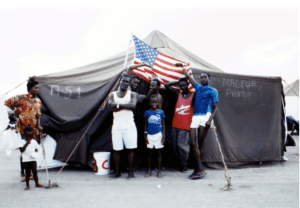Musalaha helps Christians in the Holy Land tread the road to reconciliation
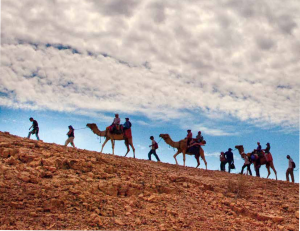
 Photography by Barry Rodriguez
Photography by Barry Rodriguez
Crammed into the murky interior of Jerusalem’s Church of the Holy Sepulcher, thousands of pilgrims gather each year to celebrate Jesus’ resurrection in the place where Christians traditionally believe he emerged from the tomb.
As fingers of “holy fire” protrude from the edicule—the ornate chamber believed to be the place where Christ was buried—priests from various Orthodox Christian groups practically wrestle to get their candles lit first, thrusting their fists into the air if their wicks are ignited before those of their “brothers” from other denominations.
Jesus’ declaration that the last shall be first and the first last appears lost amidst the temporary chaos. Yet by the end of the ceremony, believers in Christ from across the planet will raise their candles in unity, illuminating the church in a moving reminder that the Light of the World has come to earth.
Despite the unity of faith in Jesus as Lord and Messiah shared by the Palestinian and Israeli believers, they are often sharply divided by ethnicity, politics, and scriptural interpretation regarding the modern nation of Israel.
Like an animated icon, the annual event portrays the church in all its splendor and shame in a land known both for sacred beauty and brutal warfare. The strife inside the building also hints at the ongoing tensions between ethnic Palestinian Arab and Jewish Christ-followers outside the church’s walls.
Despite the unity of faith in Jesus as Lord and Messiah shared by these believers, they are often sharply divided by ethnicity, politics, and scriptural interpretation regarding the modern nation of Israel. Both Palestinian Christians and Messianic Jews suffer persecution in the Holy Land; however, Jews who believe in Jesus tend to believe that all of the Holy Land, from the Jordan River to the Mediterranean Sea, should be part of the modern nation of Israel, while Palestinian Arabs tend to favor Palestinian self-determination. Most Jewish believers also contend that biblical prophecies support the creation of the modern nation of Israel, while most Palestinian Christians believe the church has replaced political Israel as the recipient of God’s promises.
The decades-long debate over who should control the Holy Land has received more international attention lately as the Palestinian Authority has sought statehood recognition from the United Nations, but not much has changed on the ground. The daily realities of military incursions, land confiscation, and sometimes indiscriminate jailing and assaults associated with military occupation continue, only exacerbating the tension for Palestinian believers, while missile strikes, bus bombings, and the fear of another Holocaust have the same effect on Israeli Jews. Christians in Western countries often make matters worse by taking sides and claiming that the Bible supports their position.
Yet amidst the turbulence, a homegrown movement is afoot to bridge the divide among Christ’s followers in the Middle East. Among a handful of reconciliation efforts, including day camps, schools, and church gatherings, Jerusalem-based Musalaha has made the most waves over the past two decades, bridging the gap among Palestinian Christians and Israeli Messianic Jews through desert encounters and other ventures that foster understanding and build trust. Named after the Arabic word for reconciliation, Musalaha is directed by Palestinian Christian and Israeli citizen Salim Munayer and is staffed by Jewish, Palestinian Arab, and international believers in Christ. Advocates say participants have experienced the miracle of unity with their Palestinian and Israeli brothers and sisters in Christ and have gained a better understanding of their commonalities. In time, they hope to see even greater changes from such efforts, such as deeper dialogue about theology.
“There are always strains, always tensions,” says Evan Thomas, a Messianic pastor who serves as Musalaha’s chairman. “There are always those who are reluctant to let go of their pet theology or those who have a very strong right-wing, politically oriented theology who feel that they would be so threatened to think that Israel could do any wrong or, on the other side, those who would not be able to cope with any challenges to Palestinians’ political aspirations. But there is a large mainstream from both communities that are looking for the Father’s heart and actually desire to have fellowship with one another.”
 Sojourning in the wilderness
Sojourning in the wilderness
No one can deny that the Israeli-Palestinian conflict is a complex matter, and followers of Christ who live in the Middle East are entangled in the quagmire.
To get a grasp of the tension that divides Jewish and Palestinian Arab Christians, one need look no further than an organized encounter between the two groups in the summer of 1989. Munayer, who was on hand to participate and translate at the event, recalls how a “disaster” ensued after a huge political argument broke out.
“People approached each other not as brothers and sisters in the Lord; they approached each other as a theological sword,” Munayer recalls.
With hindsight, organizers should have focused on building relations and trust between participants before delving into political topics, Munayer says. The experience, which helped him and others realize how much reconciliation was needed, prompted the creation of Musalaha. The group aims to give Palestinian and Jewish Christ-followers a deeper understanding of the unity found in Christ promised in Scripture as they get to know and worship with their natural enemies.
Musalaha officially got underway when Munayer and Evan Thomas, who pastors a Messianic congregation in Israel and now serves as the group’s chairman, decided to promote unity among local Christians by taking Jewish and Palestinian believers outside of their comfort zones on a desert venture.
“In the desert everyone is equal,” Munayer explained. “There is a balance of power. In the desert everyone struggles with the conditions of the desert, and people work together to get through it.”
Participants were forced to lean on each other for basic necessities such as food and water in that harsh environment, and neither group had a natural advantage, Thomas says. Bonds began to form despite the surrounding conflict, and participants were able to honestly address the reasons for tension, including differences in theology and animosity related to the Israeli-Palestinian fracas itself. The vision they shared with other local Christian leaders has expanded in the past two decades to include such programs as sports camps and women’s and youth ministries.
There have been plenty of challenges along the way. Relations among some program participants have cooled during periods when political tensions became strong, according to Musalaha’s leaders. Over time, participants on both sides have needed to deal with longstanding racial sentiments and mutual demonization.
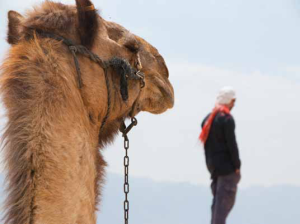 Perspectives in contrast
Perspectives in contrast
Much of the tension among Jewish and Palestinian Arab believers in Christ these days stems from political differences and theological disputes regarding who should possess the Holy Land. Like other Christian Zionists, most Messianic believers who are interested in peace and reconciliation believe God is restoring the Jewish people to the land of Israel as their biblical inheritance, though some also question military policies.
Thomas not only sees his longing for Israel as part of his Jewish heritage; it’s also part of his Christian journey. He grew up as a secular Jew in New Zealand and developed a yearning for his Jewish roots after coming to faith in Christ in 1978. That prompted him to move to Israel in 1983.
“Coming to know Y’shua, the Hebrew name for Jesus, also entailed coming to know my Jewishness,” he says. “Without inside influences, I also felt a deep calling toward the land and my birthright.”
Thomas noted that most Messianic believers like himself are opposed to a two-state solution for Israelis and Palestinians, while most Palestinians favor such a solution. He made it clear that he believed Palestinians need to be treated with dignity, but he hoped that would happen within a single state of Israel.
The Messianic pastor believes that many biblical prophecies point to a regathering of the Jewish people in biblical Israel. For example, he cited prophecies in Jeremiah 31 that state that God will gather the remnant of Israel from the north and from the ends of the earth and bring them back to biblical Israel and in Ezekiel 36 where the prophet says that Israel’s towns will be rebuilt and that God will put his spirit in the hearts of the people.
Thomas says his understanding of the Bible has impacted his understanding of the political situation in the Holy Land, though he and Munayer have come to contrasting conclusions.
“If you have a basic theology of restoration of the Jewish people to the land, it’s obviously going to affect your political perspective as well,” he says.
On the other hand, Palestinians and supporters of a two-state solution often take issue with predominate Zionist perspectives in evangelical churches.
Palestinian Arabs—including Palestinian Christians—typically agree that they were unfairly driven from their land in 1948, and they oppose Israeli policies both in Israel and the Palestinian territories that treat Palestinian Arabs unjustly. In the West Bank, they note that there are separate roads for Palestinians and for Israeli settlers, while land confiscation abounds and military checkpoints impede daily life.
Munayer believes that although the promises of the New Testament have not taken away the importance of the Holy Land, those promises have expanded to cover the whole earth.
While some Messianic believers say they strive to take an apolitical stance—even as they support Israel as a fulfillment of prophecy—Munayer takes issue with the view that one must avoid politics when delving into theological issues. When it comes to theological views about biblical lands, politics are unavoidable, he says.
“Everything in this country is politics,” he says. “The theological views of the end time and justice are political. I think many times the dominant group wants to define what is theological and what is political,” he adds. “That doesn’t work.”
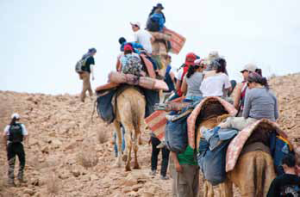 The bumpy road to reconciliation
The bumpy road to reconciliation
So how can two groups divided by both theology and politics find common ground? The answer is found in Christ’s work of reconciliation on the cross, according to Christians involved in bridge-building efforts.
“Justification is not merely an event for the individual but rather a radically social and relational one,” Munayer says.
Like the cross itself, the path to reconciliation comes at a personal cost and is painful, participants say. And while Scripture proclaims that Christ has removed the barrier between Jews and Gentiles, it takes time for traditional political enemies to experience that reality first hand.
“People don’t want to embrace the other side,” Munayer says. “It’s like the stage that boys go through when they don’t want to play with girls.”
Initially, Israeli Jewish and Palestinian Arab believers may need encouragement to connect, but when they finally do, they enjoy getting to know one another and learning about each other, Munayer says. Israeli Jews are often surprised by Palestinian grievances and charges against the Israelis and by their political and theological opinions. This can lead Israelis to withdraw and state their own accusations against the Palestinians. People on both sides accuse the other of ignoring reality and biblical truths, Munayer says.
But those who reach maturity begin to understand that both sides have genuine grievances and both sides contribute to the conflict, he says. They come to recognize that they must restore the relationships between the two peoples and work to do so. They experience personal and spiritual growth by learning about one another’s different histories and theological perspectives.
When it comes to the work of bringing together Palestinian and Jewish followers of Christ, it’s often three steps forward and two steps back, Thomas says. He notes that there are some believers who are opposed to such efforts, but he believes Christians with such extreme positions are in the minority.
Pathways to peace
Though there are certainly trends among those who dedicate themselves to reconciliation efforts, everyone’s journey is ultimately as unique as their reasons for wanting to get involved. Thomas’ quest for reconciliation came after his military experience in the West Bank and Gaza Strip during the First Intifada prompted him to rethink some Israeli military policies. He came to grapple with biblical passages such as 1 John 4:20, which states that anyone who claims to love God and yet hates his brother is deemed a liar, and Ephesians 2, which states that Christ has destroyed the barrier between Jews and Gentiles. Now, he says his theology is informed by a biblical Zionism that seeks the good of all who dwell in the Holy Land.
For Munayer, who grew up as a Greek Orthodox Christian, the cross’ role in reconciliation became apparent during a Bible study led by his uncle that contained Messianic Jewish and Palestinian believers. That same study not only led him into his life’s calling of working to bridge the gap with Jewish believers in Christ, it also became the place where he developed a personal relationship with Jesus, he says.
In more recent years, many people have begun that journey through more organized efforts. Shadia Qubti, who now serves as a camp director for Musalaha, had never even heard of Jews who believed in Jesus before attending a young adult desert trip in Jordan at age 19.
“I did not meet Messianic Jews at any other event before, although I live in Israel,” Qubti says. “This is partly due to the separated nature of the communities here—Palestinians and Jews in Israel as a whole, and as a church.”
Though she says she felt threatened at first by the Israeli Jews who participated in that trip, perceiving them as her enemy, she found a deep connection with a Messianic believer during her final day in the desert. The trip has led her on a lifetime journey of reconciliation as a staff member of Musalaha. Today she says she no longer feels threatened by Jewish followers of Christ, as she perceives them as her brothers and sisters, first and foremost, despite disputes about some theological and political issues.
“It no longer is an issue what nationality they are, because the church of God is one that embraces everyone,” she says. “Just like in any other family, siblings disagree, but we are still a family. This is what helps me in times where there are issues of disagreement with Messianic believers.”
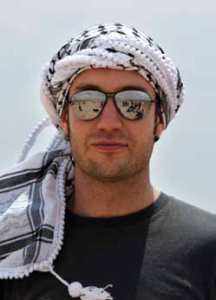 Mustard seed movements
Mustard seed movements
Critics of dialogue efforts carried out by groups such as Musalaha often say those efforts fail to produce any tangible or meaningful results, and some Messianic believers have criticized the group for having a hidden “pro-Palestinian” agenda. But advocates for reconciliation say they have witnessed powerful impacts among Jewish and Palestinian believers that often can be an example to others as well.
Thomas fondly recalls a time when people who had watched him and Munayer give a joint presentation in Basil, Switzerland, told the two men that if Israeli Jews and Palestinians could be reconciled, then they could put aside disputes in their own lives.
He also recalls a time when some Muslim girls who tagged along with a Palestinian Christian gave their heart to Christ after seeing the Arab and Jewish believers come together.
Today Musalaha is expanding its vision to include Muslims and Jews who do not worship Christ. Although there is a unique aspect of reconciliation among fellow Christians, it is also important to seek peace with people of other faiths inasmuch as it is possible, Munayer says. So far, Musalaha’s work in that regard has entailed sports camps with Muslim, Christian, and Jewish youths as well as a Muslim-Christian desert encounter experience.
While Scripture proclaims that Christ has removed the barrier between Jews and Gentiles, it takes time for traditional political enemies to experience that reality first hand.
“There’s a growing tension among Christians and Muslims worldwide,” Munayer says. “We realize that we have to address it.”
Other Christians worldwide have taken note of such peacemaking work. The Lausanne Movement missions conference in Cape Town, South Africa, in December 2010 featured a huge emphasis on reconciliation, including work between Jews and Palestinians.
During one occasion, Qubti and Messianic believer Dan Sered of Jews for Jesus talked and prayed together in front of hundreds of attendees. David Brickner, executive director of Jews for Jesus, recalled another night at the event when some attendees prepared to gather in a room to pray for Israel and others to pray for Palestine. Upon seeing one another, the believers decided to assemble for a joint time of prayer. Brickner described the event as a beautiful image of what can happen in Christ. He expressed hope that such expressions of love can ultimately attract people to Jesus.
“I can’t imagine why people don’t see that reconciliation is the theme of the gospel itself,” Brickner says. “If the gospel is not able to overcome any matter including the Israeli-Palestinian conflict, then it is not the power of God for salvation to everyone who believes.”
Arab and Messianic believers in Christ have a shared legacy as minorities within their communities, Brickner says. Though he did not want to compare suffering between the two groups, he recounted how Messianic Jews are denied citizenship and persecuted while Palestinian Christians in Israel at times suffer from Palestinian Muslims as a minority among minorities and also from Israeli Jews because of anti-Arab sentiments.
The two sets of believers have far more in common than not, Brickner says. As a result, he says he is willing to set aside theological differences about eschatology when dialoguing with Palestinian Christians. Likewise, Munayer has taken risks for the sake of reconciliation by saying positive things about Israelis, Brickner says.
“We recognize within the church in general that there are both essential and secondary and denominational issues,” he says. “We don’t have to agree on nonessentials in order to break bread, and we’re willing to worship together.”
For those who are in Christ, reconciliation is not just a feel-good activity, it’s a biblical mandate. It’s the reason that Spirit-filled believers in the Holy Land continue to work diligently toward bridging the gap between Jews and Palestinians, particularly within the church. “I’m a bit of a pragmatist,” Thomas says, “but I think we have to be pursuers of peace.”
Jonathan Partridge developed a love for the Middle Eastern church while serving as a volunteer communications assistant for the Episcopal Diocese of Jerusalem in 2002 and 2003. He has returned to the Holy Land several times since then with groups, including Holy Land Trust and Pentecostals & Charismatics for Peace and Justice. Partridge works at the Abrahamic Alliance International, a group dedicated to building bridges among Muslims, Jews, and Christians through education, dialogue, and service activities. He blogs at Middle East Musings.
Check out these other groups that work for reconciliation in the Holy Land!


